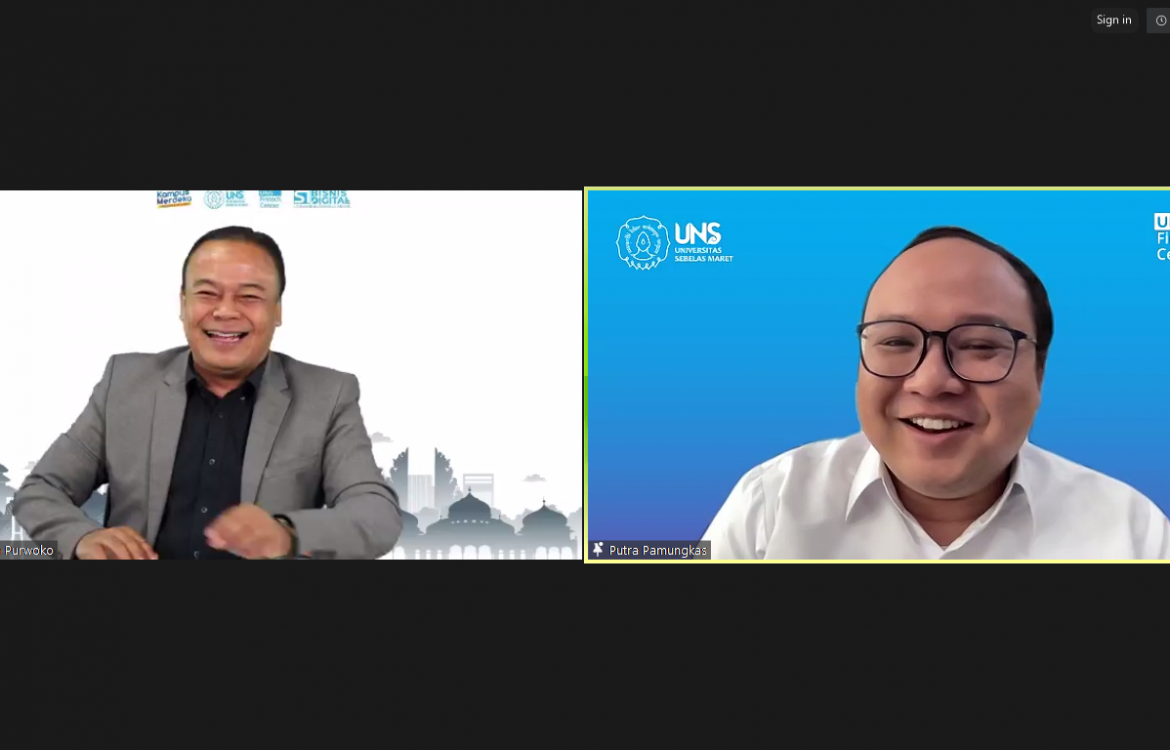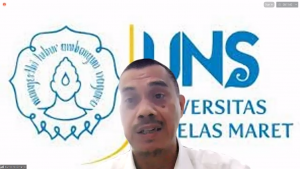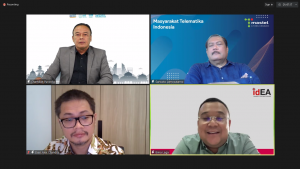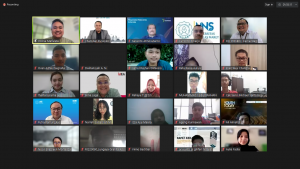
Digital Business Study Program FEB UNS Discusses Disruption in the Digital Age in a Social Commerce Webinar, a New Disruption in the Digital Era?
Digital development is closely related to disruption. In this regard, the trade sector is one of the sectors that is highly disrupted by the development of digital technology. The Digital Business Study Program, Faculty of Economics and Business (FEB), and the Center of Excellence for Fintech and Banking Science and Technology, Universitas Sebelas Maret (UNS) hosted a webinar discussing the latest topics related to Social Commerce.
Through a webinar entitled “Social Commerce Webinar: A New Disruption in Digital Era?” which took place on Monday, October 9, 2023, the Digital Business Study Program presented four speakers to discuss the topic. In front of 200 students, the Vice-Rector of Student Affairs and Alumni UNS, Prof. Kuncoro Diharjo, delivered a welcome speech.
 In his speech, Prof. Kuncoro expressed his hope that the discussion results conducted through the webinar could provide input for the stakeholders. Furthermore, it was said that the topic in this webinar was quite interesting, especially with the latest topic regarding the latest regulations by the Ministry of Trade, which led to the temporary closure of TikTok Shop as one of the social commerce.
In his speech, Prof. Kuncoro expressed his hope that the discussion results conducted through the webinar could provide input for the stakeholders. Furthermore, it was said that the topic in this webinar was quite interesting, especially with the latest topic regarding the latest regulations by the Ministry of Trade, which led to the temporary closure of TikTok Shop as one of the social commerce.
“Welcome to the audience, the speakers of the webinar, and the participants. Judging from the number of participants, it shows that this topic is very interesting to discuss. The government, through the relevant ministries, is currently preparing regulations related to social commerce because it will have an impact on microeconomics,” he said.
He further explained that social commerce is a form of business model that combines social media and marketplaces in one platform. Although the business model offers many advantages, a special regulation is needed to regulate the existence of social commerce.
“The regulation will regulate social media and e-commerce. This is important because increasing trade must be followed by strengthening domestic production. This opportunity provided an interesting forum, where the results of the discussion can be suggestions for stakeholders, and hopefully the results of a good discussion wisely and intelligently can be useful to advance the domestic economy, especially MSMEs. Welcome to the webinar, hopefully, we can get new knowledge to advance the Indonesian economy,” explained Prof. Kuncoro.
 Leading the event, Chamdan Purwoko, Senior Journalist and Business Director of Indonesia, was also present as moderator. Four speakers who were present at the webinar included Ronny Solomon Maresa, Associate Trade Analyst of the PMSE Directorate, Directorate General of Domestic Trade of the Ministry of Trade the Republic of Indonesia, Sarwoto Atmosutarno, SE., MBE., Chairman of the Telematics Society (MASTEL) of Indonesia, Bima Laga, Chairman of the Indonesia E-commerce Association (idEA), and Dr. Putra Pamungkas SE., M.Rech., PhD., who currently serve as the Head of the FEB UNS Digital Business Study Program as well as the Head of PUI Fintech and Banking UNS.
Leading the event, Chamdan Purwoko, Senior Journalist and Business Director of Indonesia, was also present as moderator. Four speakers who were present at the webinar included Ronny Solomon Maresa, Associate Trade Analyst of the PMSE Directorate, Directorate General of Domestic Trade of the Ministry of Trade the Republic of Indonesia, Sarwoto Atmosutarno, SE., MBE., Chairman of the Telematics Society (MASTEL) of Indonesia, Bima Laga, Chairman of the Indonesia E-commerce Association (idEA), and Dr. Putra Pamungkas SE., M.Rech., PhD., who currently serve as the Head of the FEB UNS Digital Business Study Program as well as the Head of PUI Fintech and Banking UNS.
The discussion, which lasted for about two hours, discussed in depth the Ministry of Trade’s regulations related to social commerce from various points of view. From the policy makers (Ministry of Trade) point of view, Ronny stated that the Regulation of the Minister of Trade aims to create a level playing field and anticipate predatory pricing. Even so, he stated that regulations will always follow innovations that continue to develop very quickly.
In line with this opinion, Bima Laga from idEA said that the role and duty of the government following the innovation is to regulate existing innovations. However, it should be noted that regulations should not discredit any of the business processes, where it is necessary to consider how a business model can compete competitively with the same quality but at a cheaper price. This includes, how this regulatory scope can create a healthier trading environment.
 In this case, Sarwoto Atmosutarno, SE., MBE, Chairman of MASTEL Indonesia, highlighted the other side of regulation, namely the need for an accurate database, which is needed in the analysis to determine the impact of the digital economy on MSMEs. This database and measurement will certainly be able to be used for impact analysis (before and after) of a new regulation.
In this case, Sarwoto Atmosutarno, SE., MBE, Chairman of MASTEL Indonesia, highlighted the other side of regulation, namely the need for an accurate database, which is needed in the analysis to determine the impact of the digital economy on MSMEs. This database and measurement will certainly be able to be used for impact analysis (before and after) of a new regulation.
From an academic point of view, Dr. Putra added that based on research conducted by PUI Fintech and Banking, e-commerce has significantly reduced offline transactions. However, based on the results of the study, there are some MSMEs that are reluctant to change and adopt digital business models. “UNS actively fostering MSMEs in terms of financial literacy and digitalization, as well as helping MSMEs to go onboard on digital platforms,” explained Dr. Putra responding to questions related to the importance of education for MSMEs.
Concluding the discussion, it was conveyed that the existing regulations needed to focus on how MSMEs continue to grow, not only stopping at digital adoption but also being able to survive in digital and real trade environments. This webinar provides an understanding of the purpose of creating the new Permendag. Indonesia shall not only be a spectator but also an actor at the international level. To achieve this goal, it is necessary to increase the competitiveness of MSMEs and production capacity to compete in the global market.
